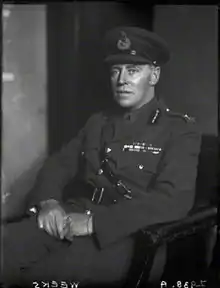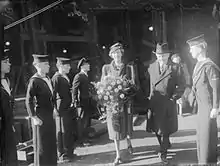Ronald Weeks, 1st Baron Weeks
Lieutenant-General Ronald Morce Weeks, 1st Baron Weeks KCB, CBE, DSO, MC & Bar, TD (13 November 1890 – 19 August 1960) was a British Army general during the Second World War.
The Lord Weeks | |
|---|---|
 | |
| Born | 13 November 1890 |
| Died | 19 August 1960 (aged 69) |
| Allegiance | |
| Service/ | |
| Rank | Lieutenant-General |
| Battles/wars | World War I World War II |
| Awards | Knight Commander of the Order of the Bath Commander of the Order of the British Empire Distinguished Service Order Military Cross & Bar |
Military career

Weeks was commissioned into the South Lancashire Regiment of the Territorial Army in 1913.[1] He served in the Rifle Brigade during the First World War and then retired from military service in 1919.[1]
He was re-employed during the Second World War, initially as Chief of Staff for the Territorial Division and then as a brigadier on the General Staff of Home Forces in 1940.[1] He was promoted to acting major-general on 17 March 1941[2] and was appointed Director General of Army Equipment in 1941 and Deputy Chief of the Imperial General Staff in 1942.[1] He then became Deputy Military Governor and Chief of Staff of the British Zone for the Allied Control Council in Germany in 1945; in that capacity he was involved in negotiations to avoid the Berlin Blockade.[3] He retired from the British Army later that year.[1]
He was awarded the Military Cross in 1917,[4] and a Bar to the Military Cross in 1918.[5] He was appointed to the Distinguished Service Order (DSO) in 1918,[6] made a Commander of the Order of the British Empire (CBE) in 1939[7] and a Knight Commander of the Order of the Bath (KCB) in 1943.[8]
Later life
After the war, Weeks became Chairman of Vickers.[9] In 1956 he was raised to the peerage as Baron Weeks, of Ryton in the County Palatine of Durham.[10]
Marriages and children
Weeks married Evelyn Elsie Haynes on 21 April 1922. They were divorced in 1930. On 3 February 1931, he married Cynthia Mary Irvine. With his second wife he had two daughters:[11]
- Hon Pamela Rose Weeks (1931–2019), married Henry Walter Plunkett-Ernle-Erle-Drax (1928–2017) and had five sons including Richard Grosvenor Plunkett-Ernle-Erle-Drax MP[12]
- Hon Venetia Daphne Weeks (1933), married Sir Peter Troubridge, 6th baronet (1927–1988)
Weeks died on 19 August 1960, aged 69, when, in the absence of male heirs, the barony became extinct.
References
- Liddell Hart Centre for Military Archives
- "No. 35118". The London Gazette (Supplement). 25 March 1941. p. 1783.
- Berlin Airlift: The Salvation of a City By Jon Sutherland, Diane Canwell, Page 11 Pelican, 2008, ISBN 978-1-58980-550-7
- "No. 29886". The London Gazette (Supplement). 1 January 1917. p. 43.
- "No. 30813". The London Gazette (Supplement). 26 July 1918. p. 8767.
- "No. 30450". The London Gazette (Supplement). 1 January 1918. p. 27.
- "No. 34585". The London Gazette (Supplement). 2 January 1939. p. 8.
- "No. 36033". The London Gazette (Supplement). 2 June 1943. p. 2419.
- Rotol-Messier Apprentices Rewarded Flight, 20 May 1955
- "No. 40827". The London Gazette. 10 July 1956. p. 4025.
- "Lord Weeks". The Peerage. Retrieved 20 April 2018.
- "Obituary of Henry Walter Plunkett-Ernle-Erle-Drax". Daily Echo. 21 July 2017. Retrieved 20 April 2018.
| Military offices | ||
|---|---|---|
| Preceded by None |
Deputy Chief of the Imperial General Staff 1942–1945 |
Succeeded by Sir Sidney Kirkman |
| Peerage of the United Kingdom | ||
| New creation | Baron Weeks 1956–1960 |
Extinct |